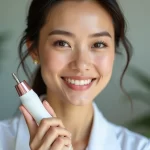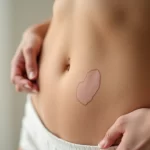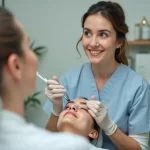Actinic keratosis (AK) is a typical skin allergy, appearing as ugly layered patches on sun-uncovered regions of the skin, like the face, ears, scalp, neck, hands, and forearms. Such injuries are dangerous and can lead to skin cancer too (SCC — Squamous Cell Carcinoma).
Figuring out the reasons for AK is the most important thing to treat the conditions. The Prevention of Actinic Keratosis and its essential tips are described below in detail.
Prevention of Actinic Keratosis, Causes and Treatment
What are the basic reasons for Actinic Keratosis?
Actinic keratosis results from long-term exposure to bright (UV) radiation from the sun or counterfeit sources like tanning beds. UV radiation harms the DNA in skin cells, prompting transformations that cause unusual cell development.
People who have light complexion, eyes, and fair or red hair are at higher risk which causes no protection from UV beams. This is because they don’t have much melanin in their skin. Furthermore, the risk of AK increases with age because of total sun exposure over the long term.
People with debilitated immunity, for example, patients of HIV or individuals on immunosuppressive meds, are additionally more defenseless. You need Dermatology services and Treatment at the early stage of the infection.
Prevention of Actinic Keratosis: Essential Tips
Before Actinic Keratosis Treatment, it needs to be prevented first. Prevention of Actinic Keratosis can lessen the cause of further development of skin infection.
One of the best measures is utilizing sunscreen consistently. This is the best way for Sun protection for Actinic Keratosis. Choose SPF according to your country’s needs. It must be higher than 30+ at least. It safeguards against both UVA and UVB radiations. Apply sunscreen all over all uncovered skin no less than 15 minutes before going outside. You must reapply sunscreen at regular intervals, or more regularly if swimming or during exercise.
You must wear protective dresses. Decide on lengthy-sleeved shirts, long jeans, and skirts produced using firmly woven textures to limit UV light exposure. Specific UV-defensive attire is likewise accessible and can offer extra insurance.
A wide cap is fundamental for safeguarding your face, neck, and ears, and shades that block 100 percent of UV rays will safeguard your eyes and the encompassing skin. Recollect that UV beams can cause critical harm even on cloudy days, so defensive dress is essential no matter what the climate. If you are on the beach, wear big-size hats. It will cover much of the body too.
Looking for shade is a simple yet compelling method for lessening UV exposure. Whenever the situation allows, remain in shadowy regions, particularly during top sun force hours between 10 a.m. Furthermore, after 4 p.m. Use umbrellas, trees, or different safe houses when going outside. If you are on the beach, wear big-size hats. It will cover much of the body too.
Avoiding tanning beds is significant for Reducing the risk of Actinic Keratosis. Tanning beds discharge unsafe UV radiation that essentially increases the risk of AK and other skin diseases. The thought that a tan offers a solid gleam is deceiving, as any tan shows skin harm. All things considered, think about utilizing dull tanning items if you want a tanned appearance without the harmful impacts of UV radiation.
Regular skin checks are fundamental for the early discovery of actinic keratosis. Lead month-to-month self-assessments, searching for new or evolving lesions, especially in exposed regions of the body. Early recognition considers brief therapy, diminishing the risk of skin malignant growth.
These Actinic Keratosis prevention tips will save you from skin infections.
What are the treatment choices for Actinic Keratosis?
The treatment choices include cryotherapy, skin prescriptions, photodynamic treatment (PDT), synthetic strips, laser treatment, and curettage with electrodessication.
Cryotherapy, the most widely recognized treatment, includes freezing the AK injuries with fluid nitrogen, making them strip off. Skin tube medicines, like fluorouracil, imiquimod, or diclofenac, can be applied to the skin to treat AK by treating the injury over the lesions to restrain cell development and Prevent AKs.
Photodynamic treatment joins a photosensitizer with a particular kind of light to obliterate strange cells. Substance strips include applying a compound answer for the skin to peel the top layers, eliminating AK injuries.
Laser treatment targets and wipes out AK sore lesions with accuracy. Curettage and electrodesiccation include scratching of the injury and utilizing electric flow to destroy the leftover unusual cells.
Mobile Skin Screening for Actinic Keratosis in Metro Phoenix, AZ
Figuring out the causes and perceiving the indications of AK can prompt early mediation and therapy, eventually lessening the risk of AK and skin malignant growth. By integrating these sun insurance procedures into your everyday daily schedule, you can essentially bring down your risk of actinic keratosis and keep up with better skin.
Mobile Skin Screening has made it easy for you to counsel with a dermatologist who can give customized direction and support to over-skin allergies. Mobile Skin Screening for Actinic Keratosis Treatment in Metro Phoenix, Arizona provides the following services:
- Skin tag removal
- Warts removal
- Mole removal
- Laser acne treatment
- Seborrheic Keratosis treatment
- Keloid treatment
- Period Acne
- Pesky skin tags
FAQs:
How can I prevent Actinic Keratosis?
You can prevent it by using sunscreen, wearing protective clothing, and avoiding sun exposure.
What are the best sun protection tips to prevent Actinic Keratosis?
Apply sunscreen, wear hats, seek shade, and use sunglasses.
Does diet play a role in preventing Actinic Keratosis?
Diet has minimal direct impact on preventing actinic keratosis.




